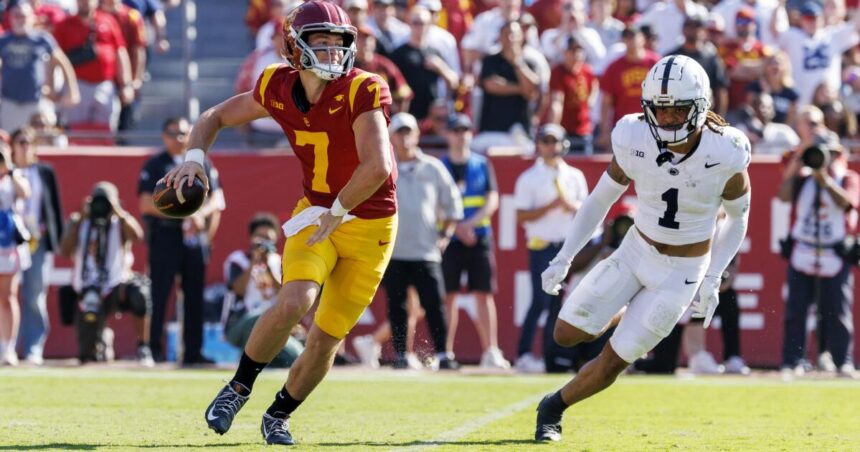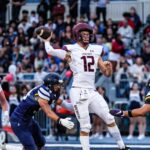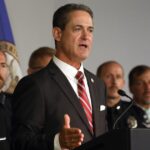Hi, everyone! I’m Ryan Kartje, your USC beat writer at the L.A. Times, back again for another edition of the Times of Troy newsletter, in which we’re once again scratching our heads, wondering what Lincoln Riley was thinking at the end of a heartbreaking loss, his third in four weeks as USC’s coach.
Because here USC was at midfield, driving on Penn State with three timeouts in hand, 1:22 left in the game and only 20 or so yards needed to draw within range of a game-winning field goal. Time was on his side. Every option was at Riley’s disposal. A narrative-altering win was within reach.
After a thwarted run from Woody Marks on first down, Riley conferred with his coaches.
“It’s second and 12, and if you don’t get anything there, you’ve just potentially bought them a series,” Riley said. “So we went back and forth on, do we use them and stop the clock? Or not?”
The clock kept running as they considered it. On second down, Miller Moss found Jay Fair for a six-yard gain. Forty seconds remained at that point, and still, Riley opted not to stop the clock.
Riley said later that he bled the clock to ensure that Penn State wasn’t left with an extra possession. But with only 40 seconds left — and still at least one more play left to run clock — the decision said a lot about his confidence in USC’s defense at that moment.
So instead of using any of those three timeouts to maintain some semblance of control, Riley let the clock continue to bleed. It wasn’t until 14 seconds remained that Penn State called a timeout to regroup for a key third down. We’ll never know what would have happened if Penn State had let USC get that third-down snap off. Would USC even have had time for another play, if it didn’t pull into field-goal range with its third-down attempt? Maybe time would have just run out on Moss, like it did for Ohio State’s Will Howard later that night.
What actually happened is Moss’ pass downfield sailed over the head of 6-foot-5 wideout Duce Robinson and was intercepted. But had there been more time, would Moss have made a better decision? Had he snapped the ball with 40 seconds left, instead of 14, would Riley have called the play he did?
Look, I won’t pretend to understand more about play-calling than Riley, aside from when I’m yelling at him to keep running the ball. But it doesn’t take a brilliant football mind to manage a play clock. How it continues to confound Riley continues to confound me.
“Clock management has been a massive issue all year,” former Trojan star Matt Leinart bemoaned on social media.
The interception may have ended the drive. But it wouldn’t change the confusing approach that had gotten them there, with barely any time to spare.
—Quinten Joyner deserves a bigger role going forward. And, to be honest, I’m not sure why he didn’t have one this week. After losing a key fumble to Minnesota, the sophomore back caught a toss on his first carry Saturday, faked a reverse and took off for a 75-yard touchdown run. On his next touch, Joyner caught a nine-yard touchdown. But after that? Just three more touches for 10 yards. Marks has been outstanding as USC’s lead back, but there’s no reason to believe that Riley can’t lean more on the run game by giving Joyner more opportunities.
—Moss did not look sharp on Saturday. But can we drop the idea that USC might bench Moss in favor of Jayden Maiava anytime soon? Riley said last week that Moss was “unquestionably” the starter, and nothing about his 20 of 34 performance Saturday should change that. Not even the poor throw that was picked off on the final drive in regulation. It does seem like something has been different the last two games, as Moss has completed just 58% of his passes. But that feels like something good coaching should be able to iron out.
—Devan Thompkins is earning trust up front. When USC’s defense lined up for the first time on Saturday, Thompkins lined up on the interior, right where Bear Alexander was expected to be. The converted edge rusher got 53 snaps on Saturday, more than any other USC defensive lineman. The increased role was a clear sign of trust in Thompkins, who actually played 19 more snaps than Nate Clifton, USC’s usual starter.
—It’s time to give some love to the punter. Eddie Czaplicki’s contributions might be easy to overlook, but he’s been a vital part of why USC has been in every game this season. Czaplicki is netting an average of 46.2 yards per punt this season, which ranks second in the nation. Against Penn State, he was especially precise, with three of his four punts landing inside the 20.
USC hoops season is here
The Muss Bus is already revving up, if you can believe it. USC will take on Texas San Antonio on Tuesday in an exhibition that gives us our first, true glimpse of a new era of Trojan basketball, and I, for one, have very little idea of what to expect of a totally rebuilt team in a totally new conference.
Even new coach Eric Musselman can’t say much for certain yet. But after watching a few practices this fall and catching an intersquad scrimmage last week, here’s a few things we can say:
—The lack of a rim-protecting big man could be an issue. Josh Cohen, a Massachusetts transfer, and Harrison Hornery, the lone returner from last season, are USC’s only two players over 6-8. And no disrespect to their skillsets, but neither is going to offer much in the way of rim protection. Rashaun Agee, the other low-post player on the roster, was an ace rebounder at Bowling Green, but for his career, averages less than one block per game. Musselman has been open with the team about rim protection being a weakness. We’ll see how he USC counters it.
—USC desperately needs Desmond Claude to step up. The most improved player in the Big East last season will be the most important player on USC’s roster in this one. Claude looks good after coming back from injury, but the expectations for him are especially high this season. Not only will he need to man the point and run the Trojans offense, but Claude will have to provide some sort of consistent shooting threat. For someone who has never shot better than 29% from three-point range, that could be a challenge.
—Saint Thomas will be the X-factor. The transfer from Northern Colorado came in without much of a national profile, but he’s made quite an impression since his arrival at USC. His versatility will be critical for an offense that is going to switch a ton between positions. Expect him to spell Claude at point guard, where his superior passing will be welcomed, while also sometimes even playing the five.
—Musselman could not possibly be more different than Andy Enfield. Start with the energy and enthusiasm, sure. At practice, it’s like USC is playing a different sport. But the coaching styles, more than anything, are on opposite sides of the spectrum. Musselman has a hand in everything within the program, where Enfield was much more laid back. Musselman is a relentless self-promoter for the program, while Enfield didn’t put nearly the same effort into that part of the job. Musselman is refreshingly honest about where his team stands, and right now, that means admitting he doesn’t know much yet.
Big Ten travel tip
College Park is one of the Big Ten cities I don’t know all that well, since it wasn’t a part of the Big Ten when I first covered the conference. But I did spend a summer in D.C. as an intern at USA Today, living just off of Dupont Circle — long enough to know that not all tourist sites in our nation’s capital are created equal.
My favorite — somewhat unexpectedly — remains the Lincoln Memorial. Highly recommend checking it out later at night, when you can take a quiet moment to stand underneath Honest Abe without many people around and appreciate how awesome it is.
While in College Park, though, I already have a deli on tap that a friend and Maryland grad suggested. Will report back in next week’s newsletter.
In case you missed it
What I’m Watching This Week
I recently finished a full re-watch of “The Sopranos,” which, for my money, is the best show in the history of television. So naturally, I devoured “Wise Guy,” the Max documentary about the making of the show. It was especially fascinating to see how the character of Tony Soprano grew both from David Chase, the creator, and James Gandolfini, the actor who played him — both of whom had some darkness to them.










